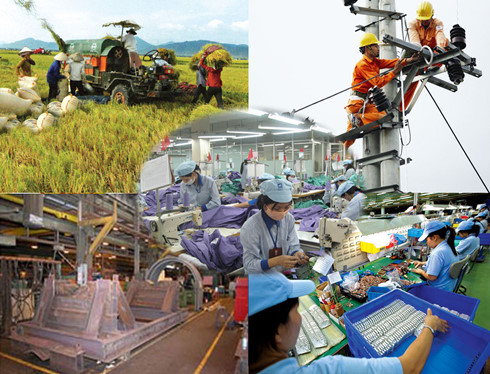Prime Minister: Vietnam can overcome its economic challenges
 |
In this vein, Prime Minister Nguyen Xuan Phuc has delivered a series of speeches outlining the country’s future challenges and introducing solutions on how they might be overcome.
The Prime Minister has said the country’s most immediate challenge over the next decade would be raising productivity to grow the economy. Per capita GDP has been on an upward trajectory over the past four years but growth is slowing.
The country’s annualized growth for 2016 has been estimated at 6.2%, the first slowdown in annual GDP growth since 2012— and well below the 7% growth that had been forecast at the beginning of the year.
Exports, which have averaged annual growth of 12-14% from 2000 to 2015, have been estimated to have slowed to 7.5% for 2016.
The export boost that was expected to have come over the next decade from the Trans-Pacific Partnership (TPP) probably won’t materialize because President-elect Donald Trump has vowed the US will not participate in the 12-member Pacific Rim free trade pact.
The demise of the TPP and slowdown in exports have also weighed heavily on investment for 2016 and would continue to weigh heavily on future foreign direct investment inflows both into and out of the country.
The Prime Minister cautioned that if the country does not find an avenue to continue growing, it would stagnate and lose ground like other countries including Taiwan, the Republic of Korea and even Japan.
That in turn could result in great economic and social problems, including high rates of unemployment.
Maintaining growth, Prime Minister Phuc said, can be achieved through increased worker productivity. To help achieve this, Phuc said the government had instituted start-up programs to support Vietnamese launch of new companies.
These companies are aimed at promoting productivity of the Vietnam domestic sector through innovative and progressive thinking.
Private-sector credit is estimated to have grown at near 20% for 2016, a rate that is not sustainable over the long term and signals the urgent need for bank restructuring to guard against another nonperforming loan crisis.
Lastly, the country faces potential problems with its monetary policy, said the Prime Minister, putting tremendous downward pressure on the value of the dong, which could depreciate by 4-5% in 2017, unless effective remedial action is not taken.
Ultimately, said the Prime Minister, the ability of Vietnam to confront these challenges lies not just with governmental policies and circumstances, but is dependent on responsible and committed leadership.
Now more than ever, Vietnam needs governmental, business and civic leaders who can win the support of the people and rally the country together to work collaboratively and cooperatively to accomplish a common goal.
And then, not only will this generation enjoy a good quality of life, but they will be able to overcome the economic challenges the country faces and look forward to a brighter future for themselves, for their children and for their grandchildren.

